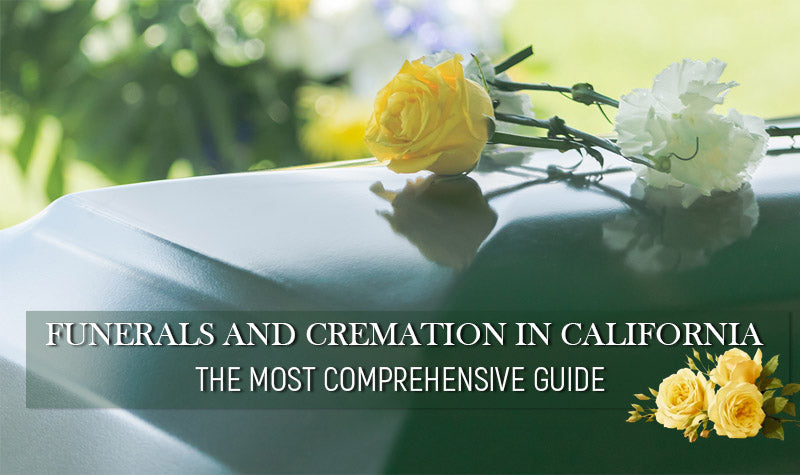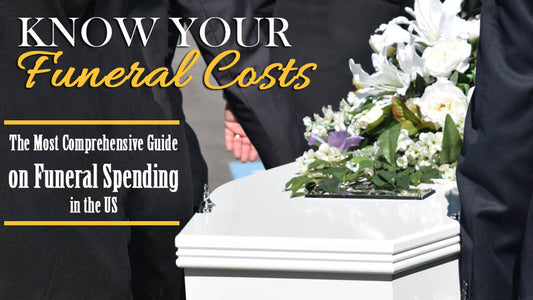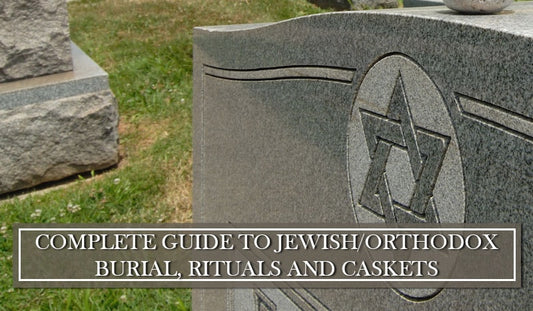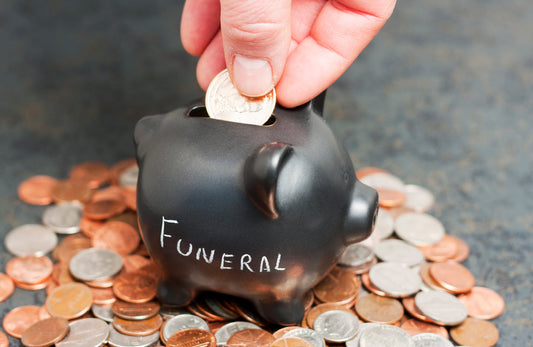
Rules and Regulations for Funerals, Burials and Cremation in California
Planning a funeral in California is going to let you choose the services and details that you want for honoring the deceased the way he/she would have wanted.
The cemetery location, the kind of funeral service, the casket, the size and text on the memorial marker, the music, or the funeral stone are only some of the many aspects you need to consider. Inside the boundaries of the law and regulations, there is plenty of room to choose the type of funeral that you want.
Keep reading to find out everything you need to know about a funeral or cremation in the state of California.
What types of funerals can you choose in California?
A funeral is a private ceremony celebrating the life of the person who passed away. When you’re making arrangements for the funeral, the type of burial you intend to have is one of the first things to choose from.
Here are the options to choose from:
- In-ground burial
- Above-ground burial in a lawn crypt
- Above ground in a community mausoleum
- Above-ground burial in a private mausoleum
- Direct burial
- Direct cremation
- Cremation with having the remains placed in an urn, at a cremation niche
- Cremation with scattering the remains in a scattering garden
- Natural burial
Every type of funeral is unique, and it provides a special meaning to the deceased. Most of the time, a person who lived a traditional kind of life will choose an in-ground burial. It's the most common type of funeral, for sure.
For this sort of burial, the body will be buried close to the loved ones, so that family and friends can come and leave flowers. A grave marker is also standard for the in-ground burial.
When planning a funeral in California, the mausoleum is another choice, and you can select a private or a public type. The mausoleum protects against the elements, and you don't need to use a memorial marker or a vault anymore.

Keep in mind that the burial has to reflect the life and values of the deceased. Choosing the kind of funeral that relates to one's life means that you care for them even after death.
What’s the best way to select a funeral home in California?
It’s common for families to hire a funeral home in California, as it’s easier for the third party to handle the services. There are around 1,200 funeral homes in California, so selecting a funeral home isn’t going to be effortless.
You must have a clear idea of what you want from the funeral home. Do you plan to have a cremation or a burial? Do you intend to have a traditional burial or a contemporary one? Where do you want to have a funeral service? How many people do you think are going to attend the ceremony?
The budget you’re planning to spend on the funeral will also have a say when hiring a funeral home. Even if you can very well buy the casket online, the prices for the services of the funeral home may vary deeply, so make sure you choose right.
What is the cost of a funeral in the state of California?
The National Funeral Directors Association (NFDA) is continually gathering information on funeral spending, stating that the median expenditure for a funeral with viewing and burial was $8,755 back in 2017. Since 2014 you would generally pay $8,500 for a funeral in California, which means the prices are rising. More and more people choose cremation over burials, cutting down the spending at $1,500 or so.
You should know what to expect in terms of prices when it comes to funerals in California. It's not the most straightforward thing to do since there are so many aspects affecting the final spending. You can find caskets with prices ranging from $2,000 to $10,000 at funeral homes, and online, the prices begin at $800.
Even if the FTC still offers consumer information on funeral spending, you won’t know for sure how much you’ll spend until you’re done with everything.
The type of spending you do for a funeral is varied, which makes it so difficult to give an accurate number of the final costs. According to the NFDA, no matter if you choose a cremation or burial, here are the highest prices to consider:
- Mandatory basic services fees
- Reparation of the body
- Removal/transportation of remains to the funeral home/at home
- Use of facilities for the funeral or viewing
- Memorial programs or printed packages
- Service car/van
- Cremation fee or embalming
- Casket, urn, or cremation casket
- Memorial marker
Keep in mind that we've only listed the primary spending. Don't forget to add the costs for mausoleum space in the cemetery/burial site, the grave liner/vault, or the fee for opening/closing the gravesite.
The obituary, flowers, the fee for the officiant, or copies of the death certificate are also costs that add up. These costs vary a lot, according to the budget you are willing to spend.
Either way, the sooner you plan for the funeral and take care of the details, the easier it is going to be for you to control every single aspect and spending. Some things, such as the casket, can be purchased ahead, especially since you don’t know what tomorrow brings. So we always suggest to check how much do caskets cost.
Which funeral location should you choose?
The location depends a lot on the type of burial you wish to have. Even if the following options aren’t the only ones, here are some of the most usual combinations to have at a funeral:
- Funeral service followed by cremation
- Funeral service with burial
- Funeral service and graveside service, and then burial
- Funeral service and crematory service, with cremation afterward
- Burial/cremation and memorial service after
- Religious funeral or cremation service
How to choose a funeral location?
The type of funeral and burial you want will impact the location as well. In the case of cremation and scattering the remains, you have to make sure that you find a cemetery with a scattering garden.
Proximity to the family can also be a significant factor when selecting the cemetery. Some also care for the cemetery's appearance. If the deceased was a veteran, you could seek the section created for the veterans. A religious statue or something else significant to the dead can also seal the deal when choosing the location.
Is the weather a factor in choosing the location?
One thing we've learned is that we cannot predict weather accurately. In the state of California, some regions have snow, so you know what to expect in terms of snowfall. Unless you're planning the funeral in the California mountains, you don't need to stress when having to open the gravesite in the winter when the ground is frozen. In winter, the roads can also be un-plowed, making driving dangerous.
If burial in a cold area of California is what you want, it's wise also to consider cremation. There's also the possibility of checking with the funeral home to see if they can store the remains in a vault. Once spring comes, digging the burial site is going to be a lot easier.
You also need to prepare in case of inclement weather on the days of the service. A canopy can provide shelter in case of rain or shade against the sun. Even if rainfall is so rare in California, you may never know what can happen.
Where to buy caskets, and are all caskets accepted in funeral homes?
See our selection of caskets, shipped fast throughout California.
California law allows casket sellers to sell caskets straight to the customers. No law is mandating you to buy the casket from the funeral home only. Moreover, it's perfectly legal to buy the casket from a third-party seller and have it delivered to the funeral home of your choice. The funeral home must accept it, and it's not legal for it to charge you for handling a casket bought elsewhere.
Additionally, the casket sellers must provide you with prices if you're talking about buying a casket.
The laws for funeral homes differ for casket retailers. It is your responsibility as a customer to check the reliability of the casket supplier. Typically, you can spare a good amount of money when buying directly from a casket retailer or online. In most cases, it is also possible to have the casket delivered to the funeral home or the mortuary.
What are the legal and financial aspects related to cremation in California?
The majority of funeral homes in California provide cremation services. The rate for cremation in California is quite high, with 6 out of 10 Californians choosing cremation.
The regulations on cremation
The law doesn't require you to buy a casket for cremation from the funeral home, but you have to use a proper rigid cremation container, nevertheless. There are special cremation caskets, which are made without the use of large metal parts. Metal caskets and regular wooden caskets typically can't be used for cremation.
The next of kin must sign the Declaration for Disposition of Cremated Remains, which gives the funeral home the legal right for preparing the cremation. There’s a mandatory waiting time after death, from 24 to 48 hours, until the cremation takes place. It’s lawful for the County Medical Examiner or the Justice to waive the requirement.
Planning a direct cremation in California
Direct cremation services are highly common in California, so costs are more affordable than in other states. However, you should still check several options and see what services are included in the quoted prices.
It’s not unusual for cremation providers not to include all the costs in the advertised offer. You need to see if the crematory fee and the cremation casket/container are also included. Typically, the prices for the death certificate and cremation permit are additional cash disbursements or "cash advance."
Laws for scattering ashes in California
There are several methods of disposition of cremated remains in the state of California:
- Burial in a plot in the cemetery
- Placement in a columbarium
- Storing in the religious shrine of the house of worship according to the local zoning regulations
- Retention at residence. You need to sign the Permit for Disposition, which shows that you received the remains.
- Removing the cremated remains from the container isn’t legal
- Scattering the cremated remains in a cemetery garden specially designed for that
- Scattering the ashes in areas that allow you to do it. You need the written permission of the owner of the property or the governing agency. It's mandatory to remove and scatter the ashes so that the public doesn't notice.
- Scattering the ashes at sea, not closer than 500 yards from shore
- You cannot transport the cremated remains without permission from the county health department.
Costs for cremation services in California
You can pay anything from $800 to $3,000 for cremation in Los Angeles. The average spending for cremation may vary, but you may very well check your options and decide according to your budget. With so many Californians opting for cremation in the last couple of years, you can expect the prices to be lower than in other states.

We should also notice that California is one of only two states with licensed "direct disposers." You can find family-owned low-cost funeral and cremation providers that have numerous locations throughout California. They're obliged by law to offer you prices over the phone and the General Price List (GPL) in case of an inquiry.
Are home funerals allowed in California? If so, what are the legalities?
Should you have not decided on the type of funeral that you want, you can always consider a home funeral.
The advantages of a home funeral
There are several positive aspects related to the home funeral, so here are the main to mention:
- Cost savings
- Control over the elements of funeral service
- Sustaining health bereavement and healing
- Supporting the cycle of life
- Giving death care a natural feel
- A more personal way to say the final "goodbye."
The rules and regulations for home funerals in California
The laws on a home funeral in California are clear, and you should understand them before continuing with the planning.
California law allows you to keep the body of the deceased at home after death. You don't need to hire a funeral director in the body preparation, funeral, or burial processes. Therefore, you are legally responsible for obtaining the death certificate, which is signed by the physician who saw the deceased.
In the state of California, the local register for births and deaths will release the death certificate. Keep in mind that you only have eight days to file it. Until the death certificate has been issued, it's not legal for you to dispose of the remains, whether by burial or cremation.
For $10, you will get the Permit for Disposition at the register's office, and this document allows you to prepare the transportation of the deceased's remains from your home to the final place of disposition. Even if people usually hire a funeral home for the shipping, it's not mandatory to do it. However, you need the permit for the crematorium or cemetery to receive the deceased legally.
Be aware that burial in California is allowed only in an established cemetery. If you live in an urban area, the home burial isn't going to be an option. For those of you living in a rural area, with land surrounding, it's possible to get permission for home burial. It's not a permit to arrive overnight, so make sure you plan well ahead for obtaining the license.
How to care for and prepare the remains of the deceased
Should the home funeral be your wish, you need to be aware of all the aspects related. You have to prepare and care for the remains of the loved one at home. There's also the possibility of hiring a funeral home to assist you in the preparation. However, the law of California doesn't require you to do so.
Many people opting for the home funeral also choose to have a natural burial. Even if embalming isn't required, some preparation of the body will be necessary.
Family members have to clean the body as a final act of caring for the deceased. The body has to be diapered for managing the biological activity that happens right after death.
One challenging aspect when having a home funeral is keeping the body cool. Using ice under and around the remains, or some cold packs are going to solve the problem.
Funerals in California during the COVID-19 epidemic

Despite the pandemic of COVID-19, people can still have funerals. However, stringent rules apply, and the local and state authorities recommend avoiding gatherings of more than two people.
New rules
The funeral industry had to adjust to the new regulations. Initially, the gatherings couldn't include more than 50 people, then the number was reduced to 15 and 10, and now it's only two. Some companies are allowing up to 10 people to participate, but they need to keep the distance among themselves.
There's also the possibility of postponing the services, delay or check the alternatives. Many funeral homes canceled memorial services in the chapels, but keep having small graveside services. No more than ten people keeping the required distance can attend.
It's also recommended that family members arrive in separate vehicles, waiting in their cars until the cemetery staff prepares the grave. The family members can approach the grave one by one or in groups of two, but only after the employees are at a distance.
The new rules affected religious rituals differently. For instance, in the Islamic culture, it's common for the family members to work with the mortuary staff for washing and to wrap the body. For now, it’s only the licensed mortuary employees at the Los Angeles center that may prepare the body. It’s a painful decision for the Islamic communities. Moreover, the graveside service only takes 15 minutes now, and not an hour like it did on regular days. The three hands full of dirt thrown into the grave cannot be thrown either.
Sitting Shiva rules
According to Jewish tradition, the burial takes place the day after death, unless it’s Sabbath. If so, it’s permitted to wait for another day.
The Shiva will take place eight days after the burial of the deceased. It's a gathering for the family and friends for saying prayers and showing support. As long as the space is generous enough, hundreds of people can attend a Shiva.
Nowadays, Shiva cannot take place any more. People choose to have it online, and more than 50 people can participate via a video conferencing app.
Tomb-sweeping
Many traditions have been altered or postponed in the time of COVID-19. April 4th is an important day for Chinese people, as it's the tomb-sweeping day when family members of all generations honor their deceased.
Due to the pandemic situation, most cemeteries in California had to cancel access to the general public.
Frequently Asked Questions
Q: What’s the first thing to do when someone dies in California?
A: If your mind is set to hire a funeral director, you should select the funeral home as soon as possible. They can walk you through the steps to take from the moment of death. Otherwise, you should look for all the things you need to take care of your own.
Q: Is it possible to get reimbursement or the support for the funeral?
A: Yes, we have dedicated blog about funeral reimbursement program here.
Q: Who has the legal responsibility for the funeral planning in the Californian state?
A: An agent under the power of attorney, the husband/wife, or a registered domestic partner has the lawful possibility to plant one’s funeral. Adult siblings, adult children, parents, and any surviving responsible adult kin can also make decisions. Unless other written instructions state otherwise, any of the mentioned categories can take care of the funeral.
Q: Is embalming mandatory in California?
A: According to the laws in California, embalming isn’t mandatory. According to a situation, a funeral institution may have to refrigerate the unembalmed body if cremation or funeral doesn’t occur within 24 hours.
If the public viewing is postponed, you need to authorize the embalming, which only delays and doesn’t stop decomposition.
Q: Is the vault or grave liner mandatory in California?
A: No Californian law obliges you to use vaults or grave liners. Most of the cemeteries have policies regarding maintenance of ground from settling after burial. This way, mowing, and support go smoother.
The vault surrounds the casket in concrete, whereas grave liners only cover the sides and the top. However, either of them will stop the decomposition of human remains.
Typically, cemeteries present their own rules on how high the grave markers can erect. It’s better that you check the rules before buying a grave liner, grave marker, or vault.
Q: Are there any rules for using a grave marker in California?
A: You don't need to buy the grave marker at the time of the funeral. Most cemeteries will allow you to have a memorial marker that erects only a couple of months after the burial. The ground needs some time to settle, and the monument won't subside if so. You get plenty of time to look for the most appropriate memorial marker too.
Q: What’s the mechanism for obtaining a death certificate in California?
A: The State Register of California Office of Vital Records (OVR) is the institution compiling all deaths. You’ll take $14 out of your wallet for a death certificate in California. You should get more than just one death certificate for sending them to different institutions.
The majority of the authority bodies that require proof of death, such as the life insurance company, can use an original copy of the death certificate. Keep in mind that the certified copies of the death certificate are valid ten days after the death.
Q: Can you transport the body from outside of California?
A: When you're planning the burial for someone else and wish to have it in California, even if the person didn't live in California, transportation is an issue. Embalming isn't mandatory in California, but you need to consider it if you're transporting the remains by the regular carrier. If so, the California Health& Safety Code 7355 obliges you to have the body embalmed. The law also states that the remains should be placed in an enclosed casket in a transportation case.
Q: Is it possible to transport the mortal remains from California to another country or state?
A: If you need to transport the deceased to the country for burial, you should hire a funeral home in California that delivers funeral shipping.
It's not complicated to transport a body within the U.S, but you need international mortuary shipping in case you're sending it abroad.
Q: What are the options for Hispanic citizens in the Californian state?
A: The highest number of Hispanic citizens is found in California, and most of them come from Mexico.
Even if many Latinos and Hispanics repatriate the remains, the "memorialization” is slowly gaining popularity too. Hispanics tend to spend more money on a funeral, as it's part of their culture they wish to honor. Therefore, the number of Hispanic mortuaries running in California is on the rise.
Q: Do you get any financial help in California if the deceased lacked life insurance?
A: Unfortunately, the situation isn't unusual. You can benefit from public or state assistance for funeral spending only to some extent. The state manages the indigent deaths, as it’s part of its responsibilities, but it uses cremation or pauper burial.
Social Security ensures a $255 death benefit payment, but only if some requirements are met.
Q: Is it legal in the Californian state to donate the body to science?
A: The answer is "yes." In the state of California, it’s possible to donate the body through a local medical school or a national body donation program.
Q: Is there something to do when you’re not happy with a funeral home in California and wish to file a complaint?
A: It’s possible to list a complaint and head it to the California Department of Consumer Affairs Cemetery and Funeral Bureau for further investigation.
Blog Author: Tim





